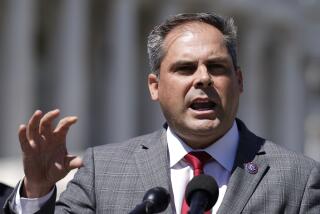GOP Finds Way to Split Finance Bill Coalition
- Share via
WASHINGTON — On the surface, a sweeping campaign finance reform bill collapsed in the House Thursday on arcana, tripped up by an obscure procedural deadlock.
But larger forces were at work that posed daunting new obstacles to legislation that twice before cleared the House by comfortable margins. And, ultimately, it was those dynamics that helped to derail, if not kill, the bill.
Republican leaders long opposed to the more sweeping reform efforts deployed tactics more sophisticated and effective than they previously used. Rather than simply try to kill the bill, they devised an alternative designed to split the campaign reform coalition.
Democratic leaders, meanwhile, had to struggle to hold their ranks together in the face of a changed political landscape. The 2000 election results had raised doubts about the proposal to abolish so-called soft money, especially among black and Latino House Democrats who believed the contested presidential election underscored the need for their party to spend more--not less--on voter mobilization drives. And it is soft money--the unlimited donations to political parties that critics charge corrupt the political process--that usually finances such drives.
The reform push also became a victim of its own success. Because a bill to ban soft money contributions and make other election financing changes finally passed in the Senate--the previous burial ground for the reformers--the stakes in the House were raised enormously. This time, House members knew a reform bill was more likely to become law, making many of them much more exacting about what should be in it and forcing them to examine whether they really backed it.
Thursday’s inconclusive House action may reflect a broader lack of consensus in the country about what fixes, if any, the political system needs.
One reason it has been so difficult to find such an agreement in Congress is that many lawmakers hear far less from their constituents about the issue than other subjects. Indeed, polls consistently show that campaign finance reform scores low in voters’ priorities.
Rep. Ray LaHood (R-Ill.) said he had just returned from an extended tour of his district during the Fourth of July recess and not a single person raised the matter.
“There’s no groundswell,” LaHood said.
Still, the issue is popular enough that GOP leaders have become increasingly reluctant to be seen as obstructing reform. That is, in part, why they took a different approach to this year’s debate. Leading the charge in the past against any effort to rein in soft money was House Majority Whip Tom DeLay (R-Texas), a controversial conservative and fund-raiser par excellence who argued that all the system needed was more disclosure.
That did not work in 1998 and 1999, when bills to ban soft money passed the House by wide bipartisan margins. In 1999, for instance, 54 House Republicans joined a nearly unanimous Democratic caucus in supporting the bill. But it was a loss of little consequence because it was clear the measure would be blocked in the Senate.
When the bill cleared the Senate this year, House Republicans clearly needed a new strategy. They rallied behind an alternative bill, sponsored by Rep. Robert W. Ney (R-Ohio), that would limit but not ban soft money. Reform advocates decried the proposal as so filled with loopholes that it would have little practical effect. But for the first time, the GOP leaders at least could argue that they weren’t merely obstructionists on the issue.
The GOP leaders have embraced a similar strategy with other issues that polls show are popular with voters, and on which the Democrats have taken the lead, such as patients’ rights in health care disputes and Medicare drug benefits. Under Speaker J. Dennis Hastert (R-Ill.), the party has abandoned the confrontational style of his predecessor, Newt Gingrich, and instead offered more limited alternative proposals.
To sell their campaign finance alternative, GOP leaders enlisted the help of the National Republican Congressional Committee, which mounted a concerted drive to sell the measure--especially among freshmen who enjoyed the benefit of party help in the 2000 election. The message they hammered home: “We’re going to give you the things you want to vote on and tools you need to win,” said one Republican strategist.
The GOP leaders also put more moderate members into the forefront of lobbying the alternative to the GOP rank-and-file. DeLay still played an important behind-the-scenes role but kept a studiously low profile in the run-up to the vote.
“It was to nobody’s benefit to have Tom DeLay perceived to be pushing the issue,” said a top Republican leadership aide.
The Ney bill also gave Republicans an alternative to lure newly disaffected Democrats.
That intensified the challenge already facing House Minority Leader Richard A. Gephardt (D-Mo.) as his once-unanimous caucus began to fracture on the reform issue.
Black and Latino Democrats were particularly worried about the effect of banning soft money on voter mobilization and education efforts because the disputed Florida presidential election highlighted the importance of those efforts. They remain bitter about allegations that minority voters were confused by ballot design and denied the right to vote.
Black Democrats--especially in the South--also have complained that the party has not used their soft money in ways that benefit their congressional races.
“The landscape has changed,” said Rep. Albert Russell Wynn of Maryland, a black Democrat who co-sponsored the Ney bill. “We need more money for voter mobilization and education, not less.”
More to Read
Sign up for Essential California
The most important California stories and recommendations in your inbox every morning.
You may occasionally receive promotional content from the Los Angeles Times.














